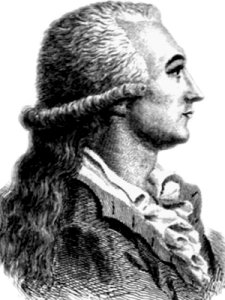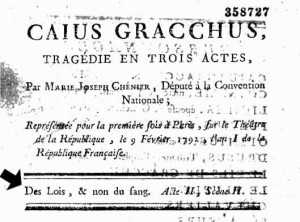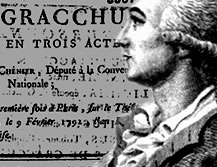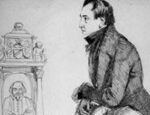Description
 Meet Marie-Joseph Chénier, the 18th-century playwright who championed lower-class liberty during the French Revolution with his patriotic and classically infused tragedies. Son of a cloth-merchant, later to become the equivalent of French consul of Constantinople, Joseph Chénier was said to have ‘decorated Melpomene with the tricolor cockade’. His plays were hugely successful and favourites of the revolutionaries… that is before they were condemned as dangerously moderate!
Meet Marie-Joseph Chénier, the 18th-century playwright who championed lower-class liberty during the French Revolution with his patriotic and classically infused tragedies. Son of a cloth-merchant, later to become the equivalent of French consul of Constantinople, Joseph Chénier was said to have ‘decorated Melpomene with the tricolor cockade’. His plays were hugely successful and favourites of the revolutionaries… that is before they were condemned as dangerously moderate!
One of Chénier’s most popular and, as it turned out, most controversial plays, was his Caius Gracchus. This tragedy celebrated the younger of the Gracchi brothers, the 2nd-century Roman tribunes who had famously both been killed by the Senate for championing the people through land reforms. Chénier ‘borrowed the voices of the Romans’ (as Daunou put it) to advocate the best way of reform in the revolution and Gracchus’ plea for ‘Laws and not blood’ became a slogan for the moderates (it would be printed on the title page at the play’s publication in 1793).
 The tragedy premièred in 1792 and became universally popular, being added to the official repertoire of the revolution and being performed another 28 times. It met with opposition, however, as the revolution got bloodier and the Terror got underway. In the changed climate of Autumn 1793, Gracchus’ pleas were branded dangerously moderate and accusations of Chénier’s royalist sympathies followed. The ultra-revolutionary Albitte produced the counter-slogan ‘Blood and not laws’ to quash this call to moderation and the play was withdrawn.
The tragedy premièred in 1792 and became universally popular, being added to the official repertoire of the revolution and being performed another 28 times. It met with opposition, however, as the revolution got bloodier and the Terror got underway. In the changed climate of Autumn 1793, Gracchus’ pleas were branded dangerously moderate and accusations of Chénier’s royalist sympathies followed. The ultra-revolutionary Albitte produced the counter-slogan ‘Blood and not laws’ to quash this call to moderation and the play was withdrawn.
Although the tragedy would be performed again in Autumn 1794 in Nantes and Angers, these productions were carefully managed to support the ultra-revolutionaries’ position. Chénier, the champion of moderation and liberty, had to stand by while his play was appropriated by the extremists who had put his brother, the renowned poet André Chénier, to death in July 1794.
n.b. For more read this article.





